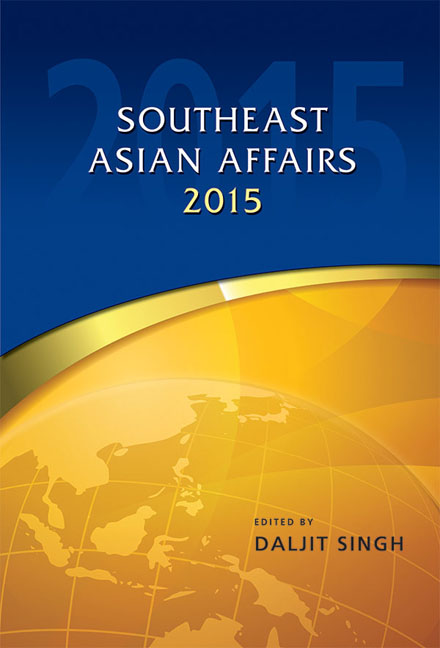Book contents
- Frontmatter
- Contents
- Foreword
- Introduction
- Acknowledgements
- THE REGION
- BRUNEI DARUSSALAM
- CAMBODIA
- INDONESIA
- Indonesia in 2014: Jokowi and the Repolarization of Post-Soeharto Politics
- Junctures of the Old and New: The 2014 Indonesian Elections
- ISIS in Indonesia
- LAOS
- MALAYSIA
- MYANMAR
- THE PHILIPPINES
- SINGAPORE
- THAILAND
- TIMOR-LESTE
- VIETNAM
Indonesia in 2014: Jokowi and the Repolarization of Post-Soeharto Politics
from INDONESIA
Published online by Cambridge University Press: 19 May 2017
- Frontmatter
- Contents
- Foreword
- Introduction
- Acknowledgements
- THE REGION
- BRUNEI DARUSSALAM
- CAMBODIA
- INDONESIA
- Indonesia in 2014: Jokowi and the Repolarization of Post-Soeharto Politics
- Junctures of the Old and New: The 2014 Indonesian Elections
- ISIS in Indonesia
- LAOS
- MALAYSIA
- MYANMAR
- THE PHILIPPINES
- SINGAPORE
- THAILAND
- TIMOR-LESTE
- VIETNAM
Summary
After a decade in power, Susilo Bambang Yudhoyono retired from the Indonesian presidency in October 2014. Arguably, his rule was the most stable period of governance in Indonesian democratic politics — counting both the sixteen years following Soeharto's fall and the seven-year parliamentary democracy in the 1950s. Accommodating a wide array of ideological, religious and social interests, Yudhoyono has been a master political integrationist. The slogan of his party (“nationalist-religious”) symbolized Yudhoyono's determination, and ability, to bridge the key divide in Indonesian society, that is, that between nationalists, who believe that religion needs to take a backseat to larger societal issues, and devout Muslims, who favour a stronger role for Islam in political life. While balancing these two groups, Yudhoyono also neutralized a host of other conflict spots. Handing out patronage posts to all major parties that sought them, and refraining from conflict with forces critical of him or democracy overall, Yudhoyono ensured that almost everyone accepted, or at least tolerated, his rule. The result of this decade-long political equilibrium looked impressive: Indonesia recorded economic growth rates last seen under Soeharto, communal violence was kept at very low levels, and one major separatist conflict — Aceh — was resolved.
Yet Yudhoyono's quiet rule was followed by the most divisive elections since the end of Soeharto's New Order regime in 1998. The struggle for Yudhoyono's succession saw renewed tensions between the nationalist and Islamic camps, and supporters of a return to some form of autocratic governance faced off with defenders of the democratic status quo. Both candidates in the 2014 presidential elections, Joko Widodo (Jokowi) and Prabowo Subianto, styled themselves as populists who promised — in very different ways — to address public dissatisfaction with Yudhoyono's steady but uninspiring government. Clearly, then, Yudhoyono's presidency had not ended the country's long-standing tensions and conflicts — it had simply bottled them up. The 2014 elections returned Indonesia to a more “normal” state of politics — one in which the heterogeneity of views and interests played out in the open instead of being absorbed into Yudhoyono's quest for societal harmony. This article describes the repolarization of Indonesian politics by evaluating the “battle of the populists” in the 2014 elections, the state of the economy as a main driver of the populist surge, and the new, more aggressive foreign policy rhetoric under the Jokowi administration.
- Type
- Chapter
- Information
- Southeast Asian Affairs 2015 , pp. 119 - 138Publisher: ISEAS–Yusof Ishak InstitutePrint publication year: 2015

